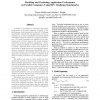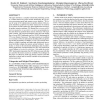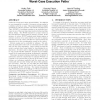102 search results - page 9 / 21 » Read-After-Read Memory Dependence Prediction |
IPPS
2008
IEEE
2008
IEEE
Modeling and predicting application performance on parallel computers using HPC challenge benchmarks
14 years 2 months ago
A method is presented for modeling application performance on parallel computers in terms of the performance of microkernels from the HPC Challenge benchmarks. Specifically, the a...
JILP
2000
13 years 7 months ago
2000
Load latency remains a signi cant bottleneck in dynamically scheduled pipelined processors. Load speculation techniques have been proposed to reduce this latency. Dependence Predi...
COGSCI
2002
13 years 7 months ago
2002
Goal-directed cognition is often discussed in terms of specialized memory structures like the "goal stack." The goal-activation model presented here analyzes goal-direct...
ASPLOS
2004
ACM
14 years 1 months ago
2004
ACM
This paper introduces a compiler-orchestrated prefetching system as a unified framework geared toward ameliorating the gap between processing speeds and memory access latencies. ...
CODES
2007
IEEE
14 years 1 months ago
2007
IEEE
Caches are notorious for their unpredictability. It is difficult or even impossible to predict if a memory access results in a definite cache hit or miss. This unpredictability i...



